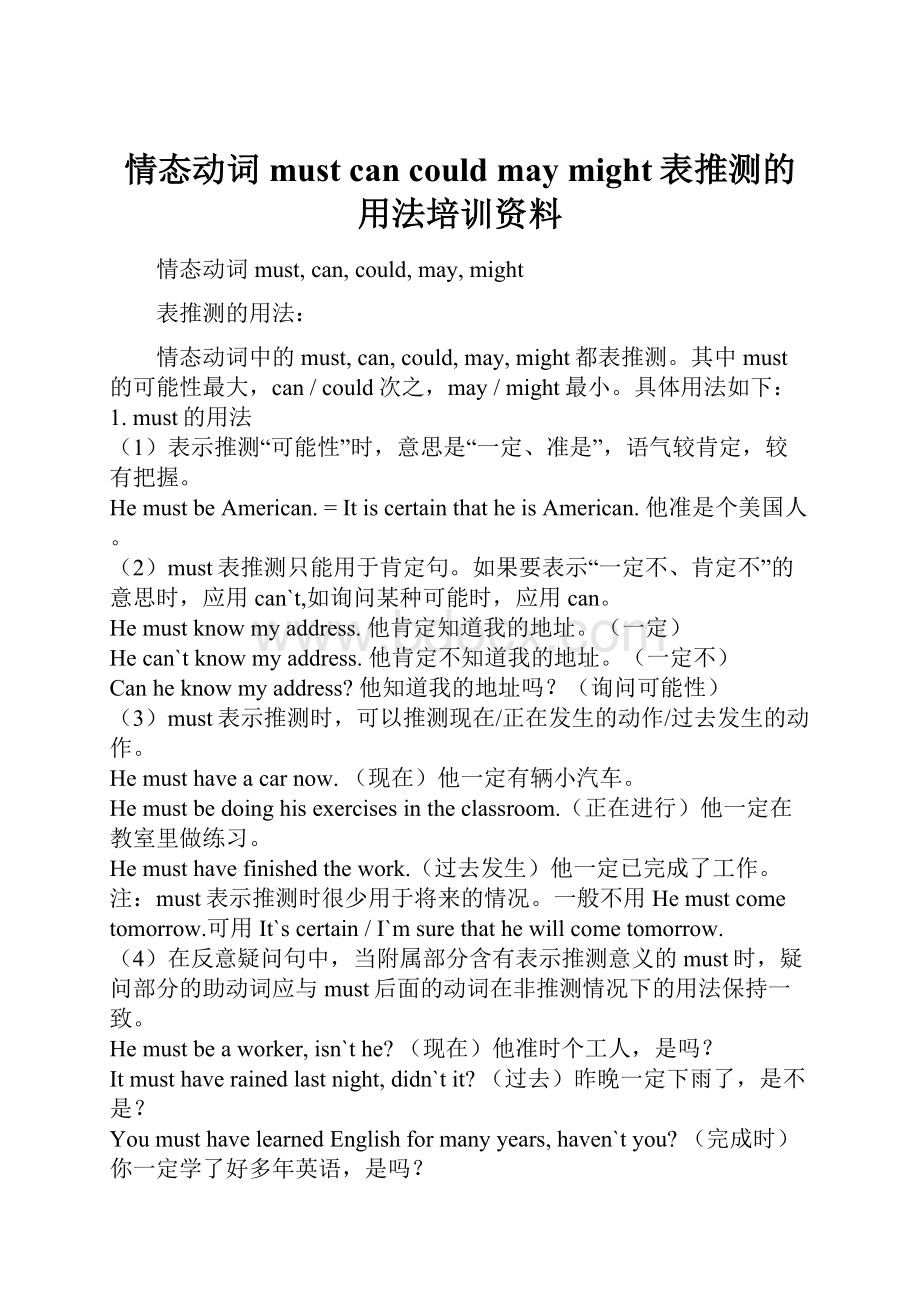 情态动词must can could may might表推测的用法培训资料.docx
情态动词must can could may might表推测的用法培训资料.docx
- 文档编号:29221103
- 上传时间:2023-07-21
- 格式:DOCX
- 页数:10
- 大小:22.78KB
情态动词must can could may might表推测的用法培训资料.docx
《情态动词must can could may might表推测的用法培训资料.docx》由会员分享,可在线阅读,更多相关《情态动词must can could may might表推测的用法培训资料.docx(10页珍藏版)》请在冰豆网上搜索。

情态动词mustcancouldmaymight表推测的用法培训资料
情态动词must,can,could,may,might
表推测的用法:
情态动词中的must,can,could,may,might都表推测。
其中must的可能性最大,can/could次之,may/might最小。
具体用法如下:
1. must的用法
(1)表示推测“可能性”时,意思是“一定、准是”,语气较肯定,较有把握。
HemustbeAmerican.=ItiscertainthatheisAmerican.他准是个美国人。
(2)must表推测只能用于肯定句。
如果要表示“一定不、肯定不”的意思时,应用can`t,如询问某种可能时,应用can。
Hemustknowmyaddress.他肯定知道我的地址。
(一定)
Hecan`tknowmyaddress.他肯定不知道我的地址。
(一定不)
Canheknowmyaddress?
他知道我的地址吗?
(询问可能性)
(3)must表示推测时,可以推测现在/正在发生的动作/过去发生的动作。
Hemusthaveacarnow.(现在)他一定有辆小汽车。
Hemustbedoinghisexercisesintheclassroom.(正在进行)他一定在教室里做练习。
Hemusthavefinishedthework.(过去发生)他一定已完成了工作。
注:
must表示推测时很少用于将来的情况。
一般不用Hemustcometomorrow.可用It`scertain/I`msurethathewillcometomorrow.
(4)在反意疑问句中,当附属部分含有表示推测意义的must时,疑问部分的助动词应与must后面的动词在非推测情况下的用法保持一致。
Hemustbeaworker,isn`the?
(现在)他准时个工人,是吗?
Itmusthaverainedlastnight,didn`tit?
(过去)昨晚一定下雨了,是不是?
YoumusthavelearnedEnglishformanyyears,haven`tyou?
(完成时)你一定学了好多年英语,是吗?
2. can/could的用法
(1)can表示推测“可能性”时,往往用于否定句或疑问句。
Can`t“一定不”,语气很肯定。
can在疑问句中意思是“会、可能”。
Hecan`tbeathome.=Itisimpossiblethatheisathome.他一定不在家。
(2)can/can`t后可接进行时/完成时,表示对现在发生的动作或过去发生的动作进行推测。
Theycan`tbereadinginthelibrary.他们一定不在图书馆读书。
Hecan`thavegonetoShanghaiforIsawhimaminuteago.
他不可能去了上海,我刚才还看见他。
It`ssolate.Wherecanshehavegone?
天晚了,她可能去哪儿了呢?
(3)在反意疑问句中,当陈述部分含有表示推测意义的can`t时,疑问部分的助动词应与can`t后面的动词在非推测情况下的用法保持一致.
Hecan`tbeateacher,ishe?
他不是教师,是吗?
Shecan`thavefinishedherhomework,hasshe?
她一定没有完成家庭作业,是不是?
(4)could可用于表示某事有可能发生或可能是事实。
Don`teatit.Itcouldbepoisonous.不要吃它,可能有毒。
Theplanecouldbedelayedbyfog.飞机可能会因为雾晚点。
(5)could还可以用于表示客气、委婉、礼貌的请求语气。
Excuseme,couldyoutellmethewaytothebusstation?
Couldyouhelpme?
(6)couldn`t表示否定推测,表示某事不可能真实,或由于特定事实或环境某事肯定不会发生。
Itcouldn`tpossiblybepoison.这不可能是毒药。
注:
有时与形容词的比较级连用强调某人或某物不可能再更多地具有某种属性。
Youcouldn`tbemorewrong.你真是大错特错。
Icouldn`tbehappier.我简直是幸福极了。
3.may和might的用法
(1) may,might表示推测“可能性”时,意思是“可能”、“也许”,语气没有must肯定。
Hemay/mightbeAmerican.=ItispossiblethatheisAmerican.
他可能是个美国人。
注:
might不表示过去时态,只是语气上比may更委婉,表示的可能性更小。
(2)may,might表推测时,可以用于否定句,意思是“可能不、也许不”,但不用于疑问句。
Hemay/mightnotbeathome.他也许不在家。
(3)may,might可以推测现在正在发生的动作或过去发生的动作。
Hemay/mightbesleepingnow.(现在)他可能正在睡觉。
Theboymay/mightnotbewatchingTVathome.(现在)
这个男孩可能没在家看电视
Thesestudentsmay/mighthaveseenthefilmbefore.(过去)
这些学生以前可能看过这部电影。
(4)may,might还可以推测将来的情况。
Ithinkweshouldtakeraincoatwithus,itmayrain.
我想我们应该带上雨衣,可能要下雨了。
Shemightnotcomethisafternoon.她今天下午可能不来了。
情态动词和虚拟语气练习40题
从A、B、C、D四个选项中,选出可以填入空白处的最佳选项。
1.—Areyouinahurry?
—No,infactI’vegotplentyoftime.I___ wait.
A.must B.need C.may D.should
2.—Someoneisknockingatthedoor.___itbeVenis?
—No,it___beher;sheleftforNewYorkthismorning.
A.Can;mustn’t B.Might;can’t
C.May;doesn’t D.Can;can’t
3.Hedidn’tagreewithmeatfirst,butI____persuadehimtosigntheagreementlater.
A.could B.might C.should D.wasableto
4.—Isthereamovieoninthecinematonight?
—There___be.Iwillphonethecinemaandfinditout.
A.might B.should C.can D.could
5.You___becarefulwhenyoucrosshere—thetrafficlightsaren’tworking.
A.can B.oughtto C.might D.may
6.You___outlastnight.Icalledyouseveraltimes,butnobodyanswered.
A.musthavebeen B.mustbe
C.mighthavebeen D.couldbe
7.You___failtopasstheentranceexaminationifyoudon’tstudyharder.
A.shall B.could C.must D.should
8.WhenIwasstudyingatBeijingUniversity,I___takeawalkalongthelake everyevening.
A.will B.would C.could D.shall
9.Thepartyturnedouttobeafailure.Iwouldrather ___it.
A.nothaveattended B.notattend
C.nottoattend D.nottohaveattended
10.Sir,you___besittinginthisseat.Itisforwomenorchildrenonly.
A.can’t B.oughtn’tto
C.won’t D.needn’t
11.—ShallItellLiMingaboutthematter?
—No,you___.Hehasknownaboutitalready.
A.oughtn’tto B.needn’t
C.shouldn’t D.mustn’t
12.—MustItakeabus?
—No,you___.Youcanwalkthere.
A.mustnot B.don’t
C.don’thaveto D.hadbetternotto
13.—Whydoyoumakemedoso?
—Iamsorrythatyou___dosuchathing.
A.would B.can C.should D.may
14.—Willyoustayforlunch?
—Sorry,I___.Mybrotheriscomingtoseeme.
A.mustn’t B.can’t C.needn’t D.won’t
15.Whatwouldhavehappened___,asfarastheriverbank?
A.ifBobhaswalkedfarther
B.ifBobshouldwalkfarther
C.hadBobwalkedfarther
D.shouldBobwalkfarther
16.Oh,Jane,you’vebrokenanotherglass.Youought ___whenyouwashedit.
A.becareful B.tocare
C.havecared D.tohavebeencareful
17.It’shightimewe___tothetheater.
A.willgo B.shallgo C.aregoingto D.went
18.—CouldIuseyourtelephone?
—Yes,ofcourseyou___.
A.could B.will C.can D.might
19.It’sstrangethatthey___nothingaboutthismatter.
A.shouldknow B.wouldknow
C.hadknown D.knew
20.—DoyoustillrememberthedaywhenwewenttotheGreatWall?
—Ican’trememberitwell,but___sometimelastautumn?
A.mightitbe B.couldithavebeen
C.coulditbe D.mustithavebeen
21.—Ican’tgetthroughtothegeneralmanager’sofficeanyhow.
—Thelineisbusy.Someone___thetelephone.
A.mustuse B.uses
C.musthavebeenusing D.mustbeusing
22.Hesuggestswe___tothecinemaatonce,otherwisewewillbelate.
A.mustgo B.go C.willgo D.wouldgo
23.Ifonlyhe___meyesterday!
A.hadseen B.wouldsee C.shouldsee D.saw
24.Ifyou___waitamoment,I’llgoandfindourmanager.
A.can B.should C.will D.must
25.—Itisrathercoldhere.Shallwelightafire?
—No,we___becausethingsareeasytocatchfire.
A.won’t B.can’t
C.mustn’t D.needn’t
26.IfI___you,I___moreattentiontoEnglishidiomsandphrases.
A.was;shallpay B.am;willpay
C.wouldbe;wouldpay D.were;wouldpay
27.—Wouldyouhavetoldhimtheanswerhaditbeenpossible?
—Iwouldhave,butI___sobusythen.
A.hadbeen B.were C.was D.wouldbe
28.—Canchildrenswiminthispool?
—Yes.However,atnotime___theydosobythemselves.
A.dare B.should
C.need D.could
29.Kunmingiscalled“SpringCity”,butit___ snowinwinter.
A.shall B.can C.must D.might
30.—What’sthematterwithyou?
—Oh,I’mnotfeelingwellinthestomach.I___somuchfriedfishjustnow.
A.shouldn’teat B.mustn’thaveeaten
C.shouldn’thaveeaten D.mustn’teat
31.—Youlooksoupset.What’swrongwithyou?
—Thedoor___.Canyouhelpme?
A.won’topen B.won’tbeopened
C.can’topen D.can’tbeopened
32.—Mum,IclimbedtogettheTeddyBearfromthetopoftheshelf.
—Mygoodness!
You___yourself.Youmustn’tdothatnexttime.
A.musthavehurt B.shouldhavehurt
C.mayhavehurt D.canhavehurt
33.Childrenunder12yearsofageinthatcountry ___beunderadultsupervisionwhenheisinapubliclibrary.
A.must B.may C.can D.need
34.“Theinterest___bedividedintofiveparts,accordingtotheagreementmadebybothsides,”declaredthejudge.
A.may B.should C.must D.shall
35.—Idon’tmindtellingyouwhatIknow.
—You___.I’mnotaskingyouforit.
A.mustn’t B.maynot C.can’t D.needn’t
36.—Mum,I’vebeenstudyingEnglishsince8o’clock.___IgooutandplaywithTomforawhile?
—No,I’mafraidnot.Besides,it’srainingoutsidenow.
A.Can’t B.Wouldn’t
C.Darenot D.Won’t
37.—Whoisthegirlstandingoverthere?
—Well,ifyou___know,hernameisMabel.
A.may B.can C.must Dshall
38.Thedriverhasdrunktoomuchwineanddangerousthings___happenatanytime.
A.should B.can C.must D.need
39.We___booked.Look,thisrestaurantisalmostempty.
A.musthave B.can’thave
C.shouldhave D.needn’thave
40.Listen!
Thefireengineisroaring.There___beafiresomewhere.
A.should B.must C.will D.oughtto
【答案及部分解析】 1~5CDDAB 6~10AABAB 11~15BCCBC 16~20DDCAB 21~25DBACC 26~30DCBBC 31~35ACADD 36~40ACADB
1.may表示“可以”。
2.can用在疑问句和否定句中,表示可能性的推测。
ca
- 配套讲稿:
如PPT文件的首页显示word图标,表示该PPT已包含配套word讲稿。双击word图标可打开word文档。
- 特殊限制:
部分文档作品中含有的国旗、国徽等图片,仅作为作品整体效果示例展示,禁止商用。设计者仅对作品中独创性部分享有著作权。
- 关 键 词:
- 情态动词must can could may might表推测的用法培训资料 情态 动词 must might 推测 用法 培训资料
 冰豆网所有资源均是用户自行上传分享,仅供网友学习交流,未经上传用户书面授权,请勿作他用。
冰豆网所有资源均是用户自行上传分享,仅供网友学习交流,未经上传用户书面授权,请勿作他用。


 《贝的故事》教案4.docx
《贝的故事》教案4.docx
